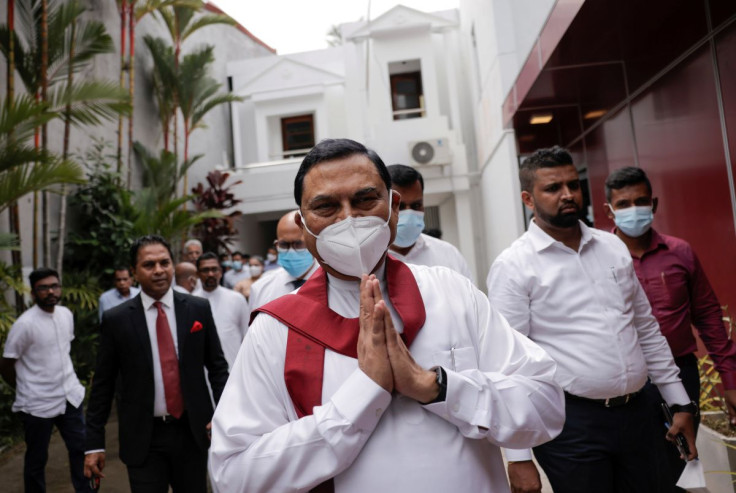Sri Lanka Stops President's Brother From Flying Out As Anger Surges

Sri Lankan immigration officials said on Tuesday they prevented the president's brother and former finance minister Basil Rajapaksa from flying out of the country, as anger mounted against the powerful family for a debilitating economic crisis.
It was not immediately clear where Rajapaksa, who also holds U.S. citizenship, was trying to go. He resigned as finance minister in early April as street protests surged against shortages of fuel, food and other necessities, and quit his seat in parliament in June.
His elder brother Gotabaya Rajapaksa will resign as president on Wednesday to make way for a unity government, after thousands of protesters stormed his and the prime minister's official residences on Saturday demanding their ouster.
The president has not been seen in public since Friday and his whereabouts are unclear. Parliament will elect his replacement on July 20.
The main opposition party has nominated its leader Sajith Premadasa, the son of an assassinated president, for the post. The ruling party is to decide on a nominee later in the day.
The Sri Lanka Immigration and Emigration Officers Association said its members declined to serve Basil Rajapaksa at the VIP departure lounge of the Colombo airport.
"Given the unrest in Sri Lanka, immigration officials are under tremendous pressure to not allow top-level people to leave the country," K.A.S. Kanugala, chairman of the association, told Reuters.
"We are concerned for our security. So until this issue is resolved, the immigration officials working at the VIP lounge decided to withdraw their services."
Pictures of Basil Rajapaksa at the lounge were carried by local media and widely shared on social media, with some people expressing anger at his attempts to leave the country. Basil Rajapaksa could not be immediately reached for comment and a close aide declined to give details.
A top official in the ruling party said on condition of anonymity that Basil Rajapaksa was still in the country.
The Rajapaksa family, including former Prime Minister Mahinda Rajapaksa, has dominated the politics of the country of 22 million for years and most Sri Lankans have blamed them for their current misery.
"FREEDOM"
The tourism-dependent economy was hammered badly by the COVID-19 pandemic and a fall in remittances from overseas Sri Lankans, while a ban on chemical fertilisers damaged farm output. The ban was later reversed.
The Rajapaksas implemented populist tax cuts in 2019 that affected government finances while shrinking foreign reserves curtailed imports of fuel, food and medicines.
Petrol has been severely rationed, and long lines have formed in front of shops selling cooking gas. Headline inflation hit 54.6% last month, and the central bank has warned that it could rise to 70% in the coming months.
Sri Lanka's sovereign dollar bonds extended recent declines on Tuesday to touch fresh record lows. The 2025 bond suffered the biggest losses, down as much as 1.125 cents with bonds trading between 25-27 cents on the dollar, Tradeweb data showed.
Protesters have vowed to stay put in the official residences of the president and the prime minister until they quit. Prime Minister Ranil Wickremesinghe did not move into his official residence, Temple Trees, after taking office in May, and was away when protesters set fire to his private home in Colombo on Saturday.
On Tuesday, seven people were hospitalised after a fight between two groups of protesters at Temple Trees, police spokesman Nalin Thalduwa told Reuters. It was not immediately clear what led to the fight.
A witness, who declined to be named, described it as a small incident.
The mood was festive at the airy colonial-era building, once one of the country's most protected with armed guards and watch-towers.
On Tuesday, several hundred people walked through its stately rooms while a young man in a baseball cap played a grand piano by a large porch, onlookers clapping along. Families with young children picnicked on the lawns, and a vendor walked through, selling lottery tickets.
At one guard box, two paramilitary soldiers with assault rifles stood by as sightseers streamed out of a waiting room after taking photographs of themselves sitting on the carved high-backed chairs.
"Freedom!" said Mallawaara Arachchi, a 73-year-old retired engineer touring the building. "What we expected we have gained. We will be the best country in the world in the near future."
(Writing by Krishna N. Das; Editing by Raju Gopalakrishnan)
© Copyright Thomson Reuters 2024. All rights reserved.





















